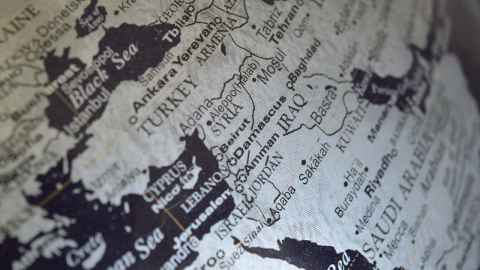Some inconvenient truths about Syria
17 April 2018
Opinion: The air strikes against Syria are not about a moral commitment to just war theory, they are a statement about alliances and enmities in a regional power struggle, writes the University of Auckland's Nicolas Pirsoul.

The Syrian war started seven years ago. While his position seemed compromised by mid-2015, Syrian President Bashar al Assad and his Russian and Iranian allies have now made consistent military gains over the past two years.
Surprisingly, regardless of his military victories, the Syrian President allegedly ordered a toxic gas attack killing more than 40 people on the Syrian rebel enclave of Doumma on April 7. This resulted in a predictably strong outcry in many Western nations. On April 14, the US, UK and France launched a series of air strikes on “chemical weapon sites” in Syria in retaliation against the attack.
It is true that the Syrian government and its allies have all used brutal means to reach their goals. This needs to be strongly condemned. The inconvenient truth that the Western media hardly remind us, however, is that the 'Syrian opposition' quickly became a coalition that included many extremist Sunni militant organisations backed by, among others, Saudi Arabia, a state long accused of supporting terrorism.
Another inconvenient truth is that the Syrian government and its allies have played a role in weakening these extremist groups. In other words, whether we like it or not, Russia, Iran and Syria are effectively fighting terrorist Islamist organisations in Syria (and, indeed, also use that pretext to justify their military actions against any rebel organisations that threatens Assad). Fighting Assad, therefore, may benefit these organisations and the international powers that back them.
There are two main issues with the pro-intervention position. First, any military intervention can potentially create further chaos and unnecessarily protract war; the war in Syria has already lasted over seven years. Unless the goal is to remove Assad altogether (and this option, highly problematic for many reasons related to the power vacuum that would be created, has been denied by the Western nations that launched the air strikes), a military intervention may only result in a temporary weakening of the Syrian armed forces. This weakening may be followed by a potential (brief) regrouping of rebel forces, before their eventual final collapse.
Any symbolic action against the Syrian government for its brutal military tactics can easily be interpreted as a testimony of Western double standards in the region, of which there is a long history.
The only result of an intervention is, therefore, an unnecessary loss of human lives to reach the same final situation. It appears, however, that weakening Assad is not the main preoccupation of the nations that launched the air strikes.
It could be argued then that this intervention is only “symbolic”: the intention is to “draw a red line” and “send a message” to show the world that chemical attacks are not to be tolerated. A focus on air strikes as a “symbolic action” highlights a second problem. Any symbolic action against the Syrian government for its brutal military tactics can easily be interpreted as a testimony of Western double standards in the region, of which there is a long history.
Saudi leaders (who in their fear of the alleged increased Iranian influence over the Muslim world vowed to remove Assad from power by any means necessary) launched a military campaign in a sovereign nation, Yemen, that led to a humanitarian catastrophe: tens of thousands people died and the country is now facing a famine that is affecting millions.
A far-fetched moral justification for attacking Syria while leaving Saudi Arabia’s actions in Yemen alone could be that low-scale chemical attacks are more inhumane than starving millions of people but such argument is, in my opinion, philosophically weak. Attacking Assad, therefore, once again, places Western nations in the anti-Iran (pro-Saudi and Israel) camp. This is the real “message” sent by the US, UK and France.
Western powers need to recognise that, since Assad is unlikely to go, another strategy is necessary.
If military action seems ill-advised and isolation (or non-interference) gives Assad and his allies the opportunity to use brutal means to keep their military advantage on the ground, the only option left on the table is conditional dialogue and cooperation with Assad.
German Chancellor Angela Merkel already hinted at this possibility in September 2015. This option, however, might not be popular with Western public opinions that have been told for years that Assad was a blood-thirsty tyrant. Furthermore, and more problematically, a rapprochement with Assad would be a slap in the face of two key anti-Iran states and allies in the Middle East: Saudi Arabia and Israel.
These alliances have already probably influenced negatively the policies of some key Western nations regarding Syria and now might be the time to reconsider them. The air strikes against Syria are not about a moral commitment to just war theory, they are a statement about alliances and enmities in a regional (if not global) power struggle.
Nicolas Pirsoul is a graduate teaching assistant and PhD candidate in Politics and International Relations at the University of Auckland.
This article reflects the opinion of the author and not the views of the University of Auckland.
Used with permission from Newsroom, Some inconvenient truths about Syria published on 17 April 2018.